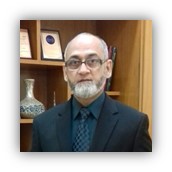
Dr. Sheikh Riazuddin (Late)
(S.I, T.I, H.I)
Professor & Founding Director
(12.06.1984 to 09.06.2009)
Dr. S. Riazuddin obtained Ph.D from the University of Reading, England in 1970. Subsequently, he worked as Postdoctoral Fellow in some of the best labs including those of Bryn Bridges at University of Sussex, Brighton, England; Larry Grossman at Johns Hopkins University, Baltimore, USA; Tomas Lindahl at Karolinska Institute, Stockholm, Sweden; and Eugene Nester/ Milton P. Gordon at University of Washington, Seattle, USA. He returned to Pakistan in 1978, and established a solid and definitive programme of molecular biology research first at the Nuclear Institute for Agriculture and Biology, Faisalabad and then as Founding Director, Centre of Excellence in Molecular Biology, University of the Punjab, Lahore. To overcome the inherent constraints of practicing advanced molecular biology research in a scientifically developing country, he established collaborations with counterpart labs to combine the complementary strengths of the participating laboratories. He made good uses of the local genetic resource in studies on (i) restriction enzymes with Richard J. Roberts (Nobel Laureate), then at Cold Sprig Harbor Labs, NY, USA; (ii) in hearing impairment with Thomas Friedman at NIDCD, Bethesda, MD, USA; (iii) in speech impairment with Dennis Drayna at NIH, MD, USA; and (iv) in vision impairment with Paul Sieving at NEI, Bethesda, MD, USA and John Gottsch at Wilmer Ophthalmology Institute, Baltimore, USA. He possesses the unique quality of combining the complimentary strengths of participating laboratories resulting in extremely productive collaborations. This has helped him to overcome the inherent constraints of working in scientifically developing country and also been a source of additional funding from agencies such as Rockefeller Foundation, NY USA; National Science Foundation, Washington, USA; National Institute of Health, Bethesda, USA and Commission of the European Community, Brussels, Belgium.






